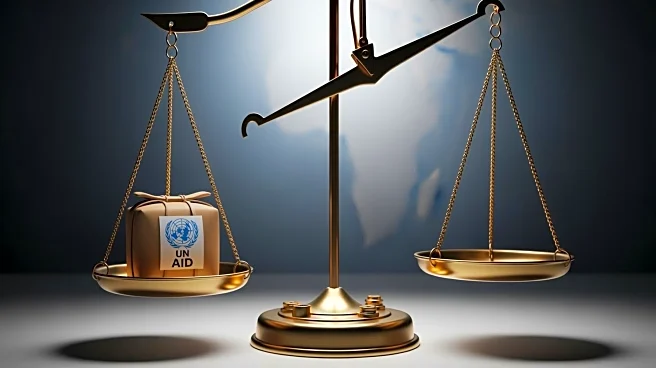What's Happening?
The International Court of Justice (ICJ) has issued an advisory opinion mandating that Israel must permit the United Nations Relief and Works Agency (UNRWA) to deliver humanitarian aid to Gaza. This decision
follows Israel's effective ban on UNRWA operations in the territory since January. The court's president, Yuji Iwasawa, emphasized Israel's obligation to facilitate relief efforts by the UN and its entities. Despite Israel's claims of bias and its absence from the hearings, it submitted a 38-page document for consideration. The ruling coincides with a fragile U.S.-brokered ceasefire in Gaza, which began on October 10, allowing 600 aid trucks to enter daily. The ceasefire aims to end a two-year conflict in the region.
Why It's Important?
The ICJ's ruling holds significant implications for international law and humanitarian efforts in conflict zones. While advisory opinions are nonbinding, they carry substantial legal weight and can influence global diplomatic relations. The decision underscores the importance of international cooperation in humanitarian crises and challenges Israel's current policies in Gaza. The ruling may impact Israel's international standing and its relations with the UN, potentially affecting future aid distribution and diplomatic negotiations. The decision also highlights the ongoing humanitarian crisis in Gaza, where severe food shortages have been reported, and international experts have declared a famine in some areas.
What's Next?
Following the ICJ's advisory opinion, Israel faces increased international pressure to comply with the ruling and allow UNRWA to resume its operations in Gaza. The UN plans to escalate aid shipments to the region, and the continuation of the ceasefire will be crucial in facilitating these efforts. Israel's response to the ruling and its impact on the fragile ceasefire will be closely monitored by international stakeholders. The decision may also prompt further legal and diplomatic actions by the UN and other international bodies to ensure compliance and address the humanitarian needs in Gaza.
Beyond the Headlines
The ICJ's ruling may have broader implications for the UN's role in conflict zones worldwide. It reinforces the principle that states cannot selectively restrict UN operations, potentially setting a precedent for future cases. The decision also highlights the complex interplay between international law, humanitarian aid, and geopolitical interests. As the situation in Gaza evolves, the ruling could influence global discussions on the protection of civilians and the responsibilities of occupying powers under international law.









